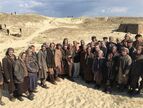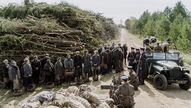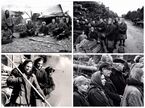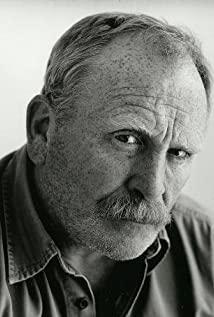The development history of human history is actually a history of civilization development and a history of wars. In the recorded human history, there have been 14,531 wars, an average of 2.6 times per year. With the development of technology and the emergence of hot weapons, the cruelty of war is unimaginable in the cold weapons era. The Second World War was the war with the largest number of casualties in history, with a total of 190 million casualties and civilians. It accounts for more than half.
In World War II, the most civilian casualties were European Jews, citizens of the former Soviet Union and its allied countries, and Chinese civilians. As we all know, in World War II, in order to eliminate Jews, Germany established a large number of concentration camps to physically destroy Jews. About 110,000 people were killed in the Xin concentration camp, most of them were Jews. The German genocide was thoroughly liquidated after the war, but don’t forget that in the country at that time, there were other A country has also established a large number of concentration camps, where the so-called enemies of the Republic are reformed through labor. This is the more terrifying and sensational labor camps of the former Soviet Union, because the General Administration of Labor Camp Management is abbreviated as "Gulag" in Russian, 1973 The term "Gulag" was known to the world since Alexander Solzhenitsyn's book "Gulag Islands" was spread to the West in 1988. The term "Gulag" began to refer to the Soviet Union’s labor camps and labor camps in the West. All forms of Soviet political persecution.
According to statistics, in the 34 years from 1929 to 1953, at least 14 million people were imprisoned in the Gulag, and more than 7 million Soviet citizens were exiled to the reclaimed areas of the Soviet Union. The Lager labor camp is closer to the area than the Nazi concentration camps. As early as in the Tsarist Russia, exiling prisoners to coolies in the harsh environment of Siberia was a punitive measure of the tsarist government. After the establishment of the Soviet Union, under Lenin’s proposal, it also inherited this tradition of Tsarist Russia, using forced labor as a suppression of opponents. And the means of punishing criminals have been greatly developed during Stalin's administration.
In 1918, the Soviet Union established the first Gulag labor camp. Since then, people who committed misdemeanors, white prisoners of the Civil War, officials accused of corruption and bribery, political opponents, dissidents, and jokes about the government People, all indiscriminately were sent to the Gulag labor camp.
On August 23, 1939, the Soviet Union and Germany signed a non-aggression treaty, and Latvia and Estonia were included in the Soviet sphere of influence; on September 28, the Soviet Union and Germany signed a treaty of friendship and borders, Lithuania was transferred to the Soviet sphere of influence, and the Soviet Union moved from Germany. After obtaining the promise there, it immediately proceeded to annex the three Baltic countries. On September 19, the Soviet Union used the Polish "Eagle" submarine incident to exert pressure on Estonia, claiming that the Soviet Union would not recognize Estonia's sovereignty over its coastal waters and that its security would be protected by the Soviet Union. , Molotov even threatened, "If you don’t want to sign a mutual assistance treaty with us, then we will have to use other channels, perhaps more severe and more complicated, to protect our country’s security. Please don’t force us to treat Estonia In order to force the Estonian government to submit, the Soviet government continued to send planes to demonstrate in the airspace of Estonia. On September 26, the Soviet Defense Council Voroshilov ordered the Soviet army to "immediately begin to build forces on the border of Estonia, and in September The completion of this operation on the 29th required the Leningrad Military District to "carry out a strong and resolute assault on Estonia." Under the force of the Soviet Union, the two countries finally signed the Soviet-Australian Mutual Assistance Treaty. Lithuanian Foreign Minister Urbus arrived in Moscow on September 30. Molotov summoned Natkyavichus, Lithuanian Minister in Moscow, and demanded that the relations between the two countries be negotiated immediately. On October 3, Lithuanian Foreign Minister Urbus Stalin proposed to return the city of Vilno and parts of Vilno Province to Lithuania, but it was necessary to sign a mutual assistance treaty based on the Sura and Soviet-Erican Treaties. Urbus pointed out that the draft treaty proposed by the Soviet Union was actually Occupation of Lithuania, but under the strong pressure of the Soviet Union, Lithuania had no choice but to sign a mutual assistance treaty. In May 1940, out of its own security needs, the Soviet Union began to change its past policy of observing the mutual assistance treaty, and instead prepared to annex the three Baltic states. On the 25th, the Soviet side claimed that "under the protection of Lithuanian government agencies," the disappearance of Red Army soldiers occurred. It noted that the Lithuanian government immediately stopped provoking, otherwise the Soviet Union would take special measures. This is exactly the same as the excuse of the September 18th Japanese Army in Northeast China. However, the Soviet drunkard was not interested in drinking and refused to reconcile with the Lithuanian government. On June 14, 1940, the Soviet Union continued to increase pressure. Molotov issued a statement saying that "The Lithuanian government tried to prevent the Soviet army from being stationed in Lithuania... .Brutally undermined the mutual assistance treaty signed with the Soviet Union and prepared to violate the border of the Soviet Union" and asked the Lithuanian government to "1. Send Skuchas and Poviidis to the court for trial; 2. Form Lithuania capable and determined to guarantee A government that faithfully implements the mutual assistance treaty and resolutely suppresses the opponents 3. Ensure that the Soviet army freely passes through the territory of Lithuania in order to be deployed in important centers of Lithuania. The number of the Soviet army should be sufficient to ensure the implementation of the mutual assistance treaty and prevent provocative actions against the garrison." Respond within 10 hours, otherwise "the Soviet army will immediately enter Lithuania." Lithuania is isolated and helpless. 15 minutes before the expiration of the Soviet ultimatum, Urbus informs Molotov and Lithuania accepts everything. Request; the Soviet government repeated its tricks and submitted a statement on June 16 to the governments of Latvia and Estonia, accusing the two countries of signing the Baltic Agreement, requiring the two countries to establish a new government and agree to the Soviet military, and give a reply within 6 hours. The government of the country is weak and has accepted the conditions put forward by the Soviet Union within the stipulated time; the establishment of the new government and the successive stationing of Soviet troops in various countries have essentially deprived the three countries of independence; the newly established puppet government and the Soviet Union have been compulsory Dissatisfaction with the garrison, a large number of patriotic Lithuanians began a free rebellion. The Soviet Union escorted a large number of Lithuanian citizens to various labor camps for labor reform in the name of enemies and potential enemies of the Republic. This is a film co-produced by Lithuania and the United States. The historical background of "Embers in the Snow", the film tells the story of a 16-year-old heroine Lina Wilkas (played by Bell Polly) in the Gulag Lagoon and her family under the terror rule of Stalin in the Baltic region during World War II. The sad and beautiful story of being separated;Polly) The poignant story of being separated from his family in the Gulag Laogai under the terror rule of Stalin in the Baltic region during World War II;Polly) The poignant story of being separated from his family in the Gulag Laogai under the terror rule of Stalin in the Baltic region during World War II;
-----------------------------
There are some spoilers below
------------------------------
From the beginning of the film, a map with a strong sense of history is used to explain the situation of Lithuania after being controlled by the Soviet Union;
Lina lives in a happy family. Her father Wilkas (Peter Franson) is a university professor or a patriot who engages in underground activities against the tyranny of the Soviet Union. Her mother Elena (Sophie Cookson) is beautiful. Dignified, her younger brother Jonas is healthy and lively and generous, 16-year-old Lina has the artistic talent of painting, and dreams of being admitted to the favorite Kaunas Art Academy (Kaunas was the capital of Lithuania from 1920 to 1940)
The wide and bright school, the hurried campus, in addition to students and teachers, under the lens of the Soviet army hanging the flag, the active-minded campus is full of strong imprisonment, and the enslaved people feel the invaders amidst anxiety Show off
The originally innocent brother talked about his classmates about hell at the dinner table, but the anxiety and fear about the future have been printed on his forehead.
Stalin's mighty bronze statue arrogantly overlooked Lithuania's new subjects, which strongly implied the complete loss of Lithuania's sovereignty. The people lived in silence under Stalin's red terror.
Random arrests of innocent citizens on the street, but in Lina's puzzled gaze, they are calm and calm with adults. The two common scenes of the fact that adults have accepted, in the eyes of minors, are puzzles of the world and human nature.
On the day Lina received the admission letter from the Art Institute, her father Wilkas had been shot due to underground activities; due to the intensified resistance activities, Stalin ordered all the suspects and their families to be sent to Siberia for labor reform.
Innocent people were forced into cars like pigs and cows to bid farewell to their homes. Many people never returned.
He was then escorted on a train, and after a six-week journey, he arrived in the Altai region of Siberia. The wanton shooting of prisoners does not require any reasons, procedures or procedures. The People's House Committee is actually a police force of the same nature as the German Gestapo.
What is even more shameful is that in order to prove to Western reporters that everything was handled in accordance with procedures, all prisoners in the labor camp had to sign a confession, and then the sentence could be reduced by 25 years, otherwise it would be life-long labor.
The prisoners can only use their labor output every day in exchange for a small one-sided wrapper to satisfy their hunger;
At the end of the film, it tells us that all this is not a fiction, but a real event in history;
In 1991, the Soviet Union disintegrated completely, and all this was the first time that the small country Lithuania started. In 1990, more than a year before the disintegration of the Soviet Union, Lithuania took the lead in independence and opened the dominoes of the disintegration of the Soviet Union; this has always been the same as the national character of Lithuania. Being tenacious has a lot to do with it. The seeds of wanting independence have always been strong. In March 1990, it was the first to declare independence. For Lithuania, which had only 2 million people at the time, it was tantamount to hitting a rock with a pebble, but Lithuania still did so. It can be seen that its hatred of Russia and the Soviet Union would rather die than independence.
At that time, the Soviet Union sent 500,000 troops to suppress the independence of Lithuania. Lithuania organized more than 1 million people to the border and formed a human wall holding hands to block the entry of Soviet troops. In the end, the Russian President Yeltsin acquiesced in the independence of Lithuania, and this gained independence. Under the leadership of Lithuania, other republics followed suit, and the Soviet Union quickly disintegrated.
For some people, the struggle for freedom continues, while for some people, the desire to be slaves has never changed.
Although this film does not have too many tyrannical scenes to present all the facts that should be revealed, in the narrative, the suffering of the Lithuanian people is presented through the experience of the Wilkas family in a slow but heavy way. In the beginning, whether the nature is good or evil, in a civilized and tolerant system environment, the good side of human nature will be revealed, while in a highly centralized society, the evil side of human nature will be vividly revealed. With the big brother watching, he didn't even dare to babble while dreaming, because the informer was right beside him.
View more about Ashes in the Snow reviews











